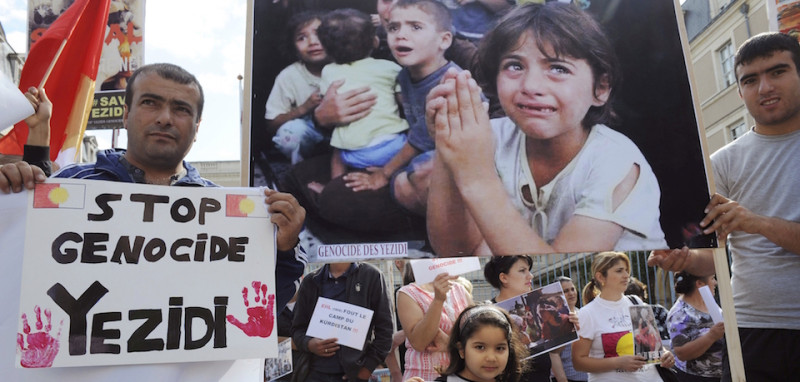Kurdistan discusses designating Aug. 3 as Yezidi Genocide Remembrance Day

08/03/2019
The Kurdistan Parliament on Thursday announced it is discussing designating Aug. 3 — the anniversary of the Islamic State’s attack on the city of Sinjar (Shingal) — as Yezidi (Ezidi) Genocide Remembrance Day to commemorate the tragic event. The bill is expected to be approved by majority vote in the next session, which is currently scheduled for Saturday.
Members of the Ezidi religious minority were subjected to extreme brutality at the hands of the Islamic State after its militants overran Shingal in August 2014, forcing hundreds of thousands to flee their homes. Others, unable to leave, remained stranded in the war zone and faced atrocities and mass executions at the hands of the extremist group for years.
Its fighters subjected women and girls to sexual slavery, kidnapped children, forced religious conversions, executed scores of men, and abused, sold, and trafficked females across multiple areas they controlled in both Iraq and Syria.
Before the 2014 attack, there were roughly 550,000 Ezidis in the Kurdistan Region and Iraq. As the militant group took over large swaths of territory in Nineveh province, where Shingal is located, 360,000 of them escaped seeking refuge elsewhere, according to the Kurdistan Regional Government’s (KRG) Ezidi Rescue Office.
According to the office, dedicated to the rescue of Ezidis kidnapped by the Islamic State, during the first day of the attack, it killed 1,293 individuals and in the months that followed, kidnapped 6,417 (3,548 males and 2,869 females) members of the Ezidi community.
The rescue office latest statistics indicate that 3,509 of them have been rescued (1,192 women, 1,033 girls, 947 boys, and 337 men), while 2,908 remain missing. Furthermore, there are 2,745 Ezidi children who have been orphaned.
So far, 80 mass graves containing the remains of Ezidis have been found in Shingal and its surroundings among the remains of what used to be a thriving city, now largely rubble. At least 68 temples and other religious buildings were also destroyed.
Disputed between Erbil and Baghdad, the area is currently under the control of Iraqi security forces and mostly Shia militias. These forces, plus a limited number of Peshmerga and other Kurdish fighters, are present in Shingal and its outskirts, with reports of tensions over who will control the strategic town that lies near the Syrian border.
On Saturday, six months after the death of the former head of the Ezidi community, his son Hazim Mir Tahseen Beg was sworn in as the new leader.